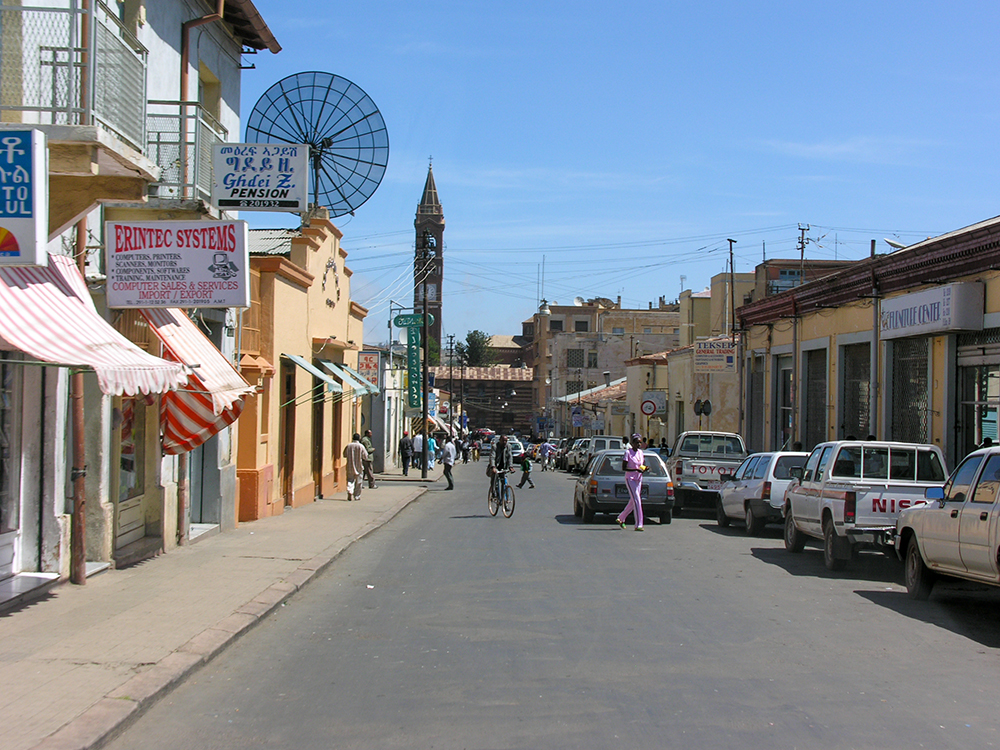
Asmara
Hatem Al-Kinani
The road to Asmara is a residence in strife, I didnt feel the eloquence of writer Adel Al-Qassass phrase - and Adel is one of those who were fascinated by that city, as lovers are fascinated by their beloved - until the bus started from the city of Keren, in the middle of the road between Tesenay and Asmara, twisting deep in the mountains, rising like a jet plane without engines or wings, heralding the elevation and the green beauty that alleviates the severity of the eternal fear of ascending to the heaven and earth paradise at once.
Before that, with the warm official and popular reception for those coming from the war, and due to the feeling that the two neighboring border regions, Kassala and Gash Barka, are an extension of each other in terms of topography, climate, society, and prevailing languages, I didnt feel that I actually crossed the border despite the stamp that the Eritrean officer stamped on my passport at the crossing.
The residents of Tesenay read the features of those fleeing the war on the faces of the Sudanese and ask about Khartoum with sorrow and sincere sympathy. That sympathy shown by a neighbor to a neighbor and an old friend to his friend in times of trouble. They ask, and Khartoum is their home just like any Eritrean city: Where did you come from in Sudan? When did you leave Khartoum? How did you leave it? What is happening? And more feelings are apparent in the questions: sorrow, confusion, noble sympathy, and more than that, the rare metal of love. One of them says to me: What is happening in your country is shocking to us. It is our safe haven if we face troubles.
We spent our first day at the Eritrean crossing waiting for the buses heading to Tesenay. The authorities took care of transporting the Sudanese for free from the border to the city. We arrived at sunset at the regional administration building, where lunch was prepared for all bus passengers. Most travelers stayed in the small, upscale hotels near the bus station. The next morning, I headed to the ticket office to learn for the first time, as a newcomer from the chaos and selfishness of Khartoum, the value of orderly queues without fuss. My fellow Sudanese and I discovered that they had allocated a line for us that precedes the citys residents lines. It was an impressive act of kindness and a gentle honor to our grieving hearts.
I spent nearly two days as a tourist in Tesenay, a light-hearted city that resembles the spontaneity of villages. Its market is quiet and intimate, and its movement is calm without monotony. Races and languages mix and interact. The coffee there is as if you are drinking it for the first time. It is a center for cross-border trade that benefits both the seller and the buyer. In the signs of the shops, the three languages are repeated: Tigrinya, English, and Arabic, and with few cars, the streets are filled with bicycles and beautiful women.
On the way to Asmara, leaving Keren, a sign appears above the gate of a fence in a magnificent height, and from a distance, you will read on the banner: (Sudanese Cemeteries). While trying to take another visual picture before the bus swerves up one of the steep slopes, I remembered the novel of those who visited the grave of the late artist Mohamed Ahmed Sarour in Eritrea. Then I guessed that he must be buried among those towering green mountains, a place that befits the body of the artist.
Asmara is a deep city, and the visitor becomes familiar with its streets from the first step. It is inhabited by politeness, kindness, and the rigidity of colonial modernity, and its pedestrians are elegant as if they are going to a permanent party. Its women, with their great beauty, tenderness, and fine taste, have a dense presence in the citys life, weaving its streets and markets with diligent work and spontaneous politeness. At an altitude of 2325 meters above sea level, the weather fluctuates between rain and light sunshine. Between the citys mosques and churches, an entire nation comes and goes, and cafes and bars are filled with everyone seeking life. Its food is delicious, reminding you of the taste of spices with every bite. The city wakes up until midday, then goes into its siesta, to wake up to its fascinating joy in the afternoon. Despite the scarcity of electricity and water and the difficulty of accessing the internet service, the city maintains its cleanliness, splendor, and the radiance of its inhabitants faces with sincere kindness.
The citys hotels are filled with those fleeing the recent and eternal war in Sudan, seeking a warm passage to the far corners of the world: children and their mothers and fathers, students and graduates, employees and business owners, going on regardless of what happened or will happen, seeking a normal life in their tours between the embassies of the world, airlines, airports, and land crossings. Because two obsessed men could no longer tolerate living under each others wings, and both bear the burden of the atrocities that each of them has committed.

